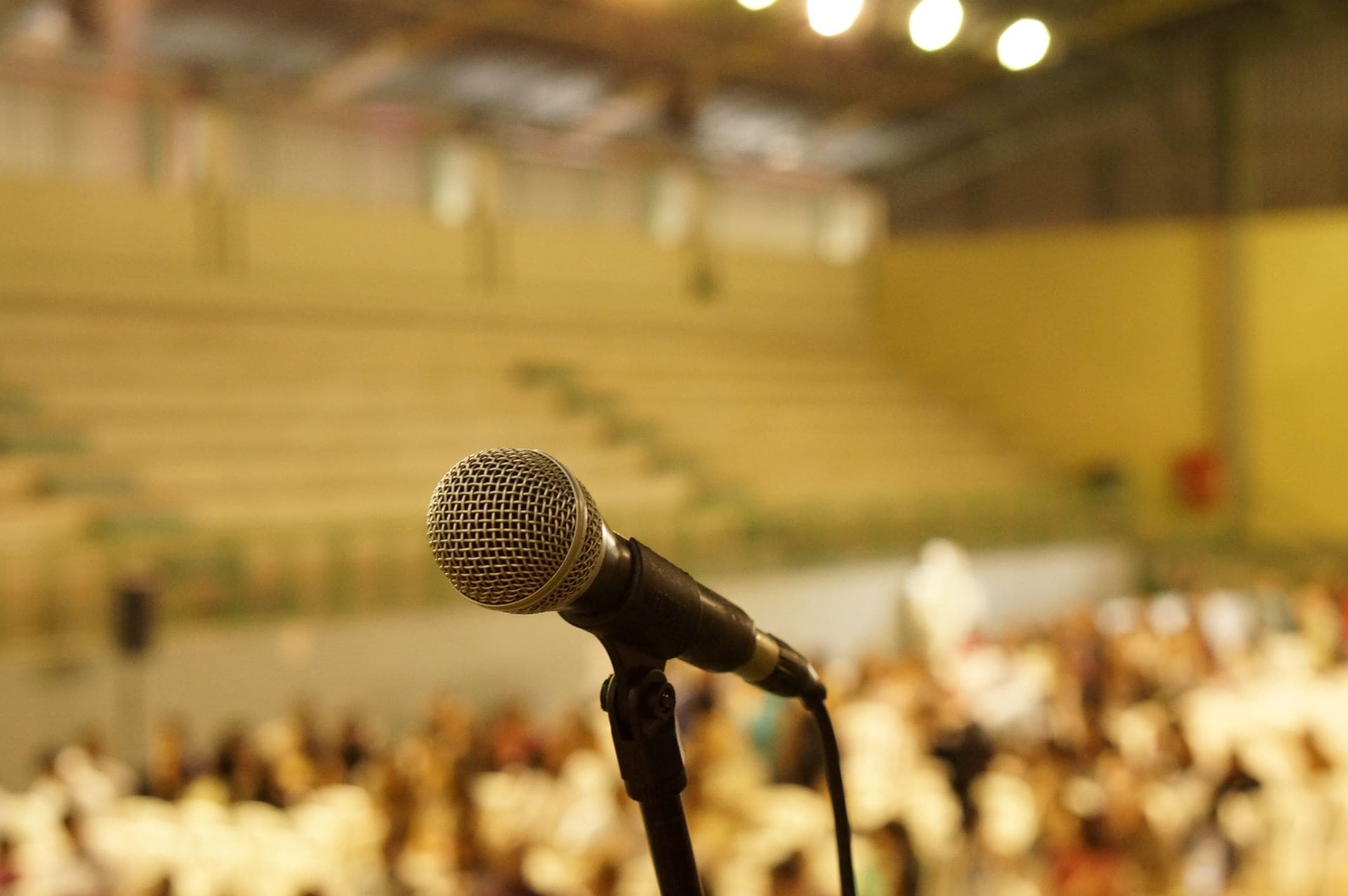How afraid are you of public speaking?
Stage fright is well known to everyone, everyone experiences anxiety in different ways and to different degrees during a speech, a presentation or a performance. On the other hand, when stage fright becomes too intense and borders on a fear of public speaking or even a phobia, those who suffer from it find themselves locked in, unable to overcome the terror that paralyzes them.

Table of contents
- What is glossophobia?
- Fear of public speaking and social anxiety
- What is the origin of the fear of public speaking?
- How is this fear of public speaking disabling?
- What are the symptoms of fear of public speaking?
- What are the consequences of this fear?
- Some tips on how to handle this situation in a hurry
- What treatment for this phobia?
1. What is glossophobia?
It is very difficult for you to speak in public? Do you have major anxiety when you have to present yourself? The idea of giving a presentation, a speech or any other kind of speech is difficult to bear?
Glossophobia is the fear of speaking in public, in front of a large or small group. Glossophobia is one of the most common phobias that exist, and nearly 75% of people report being uncomfortable speaking in public. Up to 4 out of 10 people have glossophobia of varying degrees of intensity.
Glossophobia is present and accentuated by various reasons:
- not being used to speaking in public and avoiding these types of situations.
- not having learned how to speak in public when there are different techniques that can help you express yourself
- Fear of showing your emotions in public
- the negative thoughts that overwhelm us at the idea of speaking in public: doubting ourselves, thinking that we will make a fool of ourselves, fear of disappointing the people who listen to us…
- have difficulty channeling stress
- lack of self-confidence
2. Fear of public speaking and social anxiety
Glossophobia is often seen as a symptom of social anxiety and can therefore often be confused. In a social phobia, the person may indeed be afraid to speak in public like a person with glossophobia.
However, glossophobia is a different disorder from social phobia. Social phobia is a phobia that makes people fear any social situation, not just speaking. Whereas people who suffer from glossophobia will not show any phobia other than when speaking or the possibility of speaking.
3. What is the origin of the fear of public speaking?
There is no single possible origin for glossophobia. It can be due to a trauma, to education or by hereditary factors. Nevertheless, the phobia is a long-lasting and strong one, due to all the avoidance of situations that could harm you.
a. Traumatic origin
Glossophobia can be triggered at any time in life, following a trauma. This trauma may have occurred many years ago, but may not have had a direct impact, and may come back at an unexpected time.
For example, you spoke in front of a group of people who laughed at you and judged your presentation negatively. This event has registered in you, and a similar situation has triggered again the anxiety you may have had at that time.
You can also experience the trauma vicariously. You have heard the story of someone or seen a friend who has been in a speaking situation that went badly and this has caused you intense anxiety in those same situations.
b. Educational background
A family overprotection can be at the origin of your glossophobia.
You may come from a family in which your parents, grandparents, brothers and sisters… kept telling you off, judging you when you tried to speak up and not giving you room to express yourself.
c. Hereditary origin
The onset can be hereditary. If one or both of your parents suffer from glossophobia, you are more likely to have it too.
But be careful, genetics alone is not enough to have this phobia. On the other hand, it can create predispositions to your anguish in front of these situations.
4. How is this fear of public speaking disabling?
When we are afraid to speak in public, we often create avoidance in front of these situations. We therefore limit ourselves in our physical, cultural, social and professional activities. This phobia will prevent you from participating in certain activities with your group of friends or family. Such as going to see a show for which you are likely to be taken to task by the person, giving your opinion during discussions between friends…
The people around you will want to continue these activities, and you may feel excluded. So much so that this isolation from your group of friends may cause you to experience depressive phases.
5. What are the symptoms of fear of public speaking?
People suffering from fear of public speaking have an anticipatory anxiety of these situations and a tendency to avoid them. This anticipatory anxiety is triggered as soon as public speaking is scheduled, but also before any situation where public speaking is possible (e.g. a professional meeting). You may be concerned during speeches, for example, but also when you participate in a meeting where you are likely to have to answer various questions and therefore find yourself in the center of attention. When speaking in front of an audience, the person who is afraid to speak in public feels embarrassed and stammers, feels an increase in heart rate, trembling and sweating…
6. What are the consequences of this fear?
Glossophobia can have different repercussions on the professional level. Indeed, the person will prevent himself from speaking in meetings, from giving his opinion or from making presentations. He or she may not ask for a promotion or for help at work. Like any phobia, this one can appear overnight and therefore impact certain professional activities that have not posed any particular problem until now.
This phobia can also have an impact in the personal sphere: with the impossibility of giving speeches during certain events such as birthdays and weddings…
Moreover, glossophobia is frequent in teenage children and can have an impact on their school career with an impossibility to present poems, lectures…
7. Some tips on how to handle this situation in a hurry
Having alternative strategies can help you overcome an anxiety-provoking situation, but does not solve your difficulties. It is therefore important to be able to use them in an “emergency” situation, but they do not replace a therapeutic follow-up. Therapeutic follow-up allows you to stop dealing with these situations in a sustainable way.
a. Breathe
To begin, learn to breathe consciously. Inhale through your nose and expand your belly. Let the air enter your body, and enjoy the freshness of the air entering you. Take your time. Breathe in through your nose and out through your mouth, deflating your belly.
b. Hydrate
Dehydration creates a strong fatigue and thus decreases the cognitive functions. It affects brain activity. Tasks become increasingly difficult to perform when dehydrated.
c. Find nearby landmarks
You can narrow your field of view by restricting the space around you. Focus on a tree near you, a rock a little further away… If you can’t find a landmark too close, imagine it. Visualize a point (white, black, green) in your direction, and focus on it.
You can also try to follow daily exercises to bring yourself into the present moment and try to overcome your shyness to speak in public for example.
8. What treatment for this phobia?
While the fight or flight response worked well when humans had to fear enemy attacks and wild animals, it is not effective in a meeting room. Getting to the root of your fear can help you take effective steps to manage it.
Like all phobias or anxieties, the earlier it is considered and addressed, the easier it will be to get rid of the symptoms. However, it is never too late to take control.
Therapeutic follow-up is essential. Cognitive-behavioral therapies (CBT) have been proven to be effective in the treatment of vacuum phobia. Virtual Reality Exposure Therapies (which are part of a CBT dynamic) will allow the patient to be confronted with these anxiety-provoking situations in order to create a habituation of the latter. The exposure to these phobogenic situations will be done in a gradual way, to apprehend the techniques and the tools to palliate them, from relaxation to listening and accepting one’s emotions. Little by little, anxiety about these situations will finally diminish.

